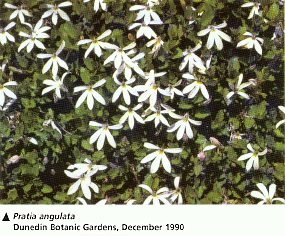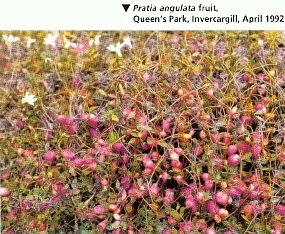|
 Alpine
Plants Alpine
Plants
of New Zealand
Pratia
angulata
Panakenake
Family
LOBELIACEAE
 Reproduced
from Reproduced
from
Alpine Plants of New Zealand
ISBN 0 7900 0525 5
by kind permission of the author, Lawrie Metcalf and Reed Publishing
(NZ) Ltd
Publication or other use of images or descriptive
text on these pages is unauthorised unless written permission is
obtained from the author and publisher. Appropriate acknowledgement
of the publication Alpine Plants of New Zealand must always
be given.
Description
- A wide-spreading,
creeping and rooting herb which often forms large or extensive,
matted patches. Stems slender and much interlaced.
- Leaves: Variable
in size, 4-12 mm by 3-13 mm, more or less rounded with a few rather
coarse teeth around the margins.
- Flowers:
White, 7-20 mm long, produced singly on slender stalks from 2-6
cm long.
- Fruits: Magenta
or purplish-red berries are rounded or oval and 7-12 mm in diameter.
 Distribution
& Habitat Distribution
& Habitat
- North, South and Stewart
Islands in lowland to low alpine regions throughout. Sea level
to 1300 metres.
- Common in damp situations
in subalpine grasslands, banks, streamsides, open forest and herbfields.
Notes
- Identification:
Grows in a wide variety of situations, and easily recognised because
of the way the flower is split along one side so that the five
petals (corolla lobes) are unevenly spaced around it. Not infrequently,
ripe fruit can be seen on plants at the same time that they are
flowering.
- Flowering:
Between October and April.
- Fruiting:
January to July.
Web-notes:
Alpine Garden Links
On
this site
Reproduced from Alpine Plants
of New Zealand:
Also see the article
by Raymond Mole on:
New Zealand Alpine Plants: A Challenge for
Growers
 External
Links External
Links
New
Zealand Alpine Garden Society
More
Plant Profiles
|



 Reproduced
from
Reproduced
from Distribution
& Habitat
Distribution
& Habitat